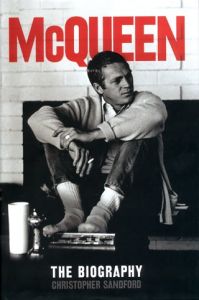Book Review
Christopher SANDFORD: McQueen ; HarperCollins, £16.99; ISBN 0-00-257195-1; 497pp
Steve McQueen was born in 1930, died in 1980. In between he made 28 films. Many were hugely popular, some were very good, a few both; The Magnificent Seven, The Great Escape, The Thomas Crown Affair, Bullitt, Papillion. By the late 1960's McQueen was the biggest movie star in the world. He was also, according to Christopher Sandford, paranoid, schizophrenic, an alcoholic, a drug addict, a self-destructive hell-raiser obsessed with fast cars and compulsive extra-marital sex with thousands of groupies and starlets. And by 1970, he had added viciously sadistic wife-beater to his accomplishments. A relentless fighter, he could be charming, witty, and wonderful company, a man who showed deep loyalty to a handful of select friends. Obsessively tight with money, he was secretly extremely generous, supporting many worthwhile causes. He genuinely loved children, and children adored him in return.
McQueen's appalling childhood - abandoned by his father, brought up by his alcoholic bipolar prostitute mother, beaten and possibly sexually abused by one of her later partners, living in abject poverty - explains the angry, ambitious young man he became. It does not though absolve the monstrous superstar he then turned into, and McQueen himself was frequently remorseful over his extreme behaviour.
Christopher Sandford has previously written rock biographies and three novels. This is his first movie book, and he clearly views McQueen in much the same light as rock bad boys such as Bowie and Jagger, with whom he tells us McQueen was friends, though recounts little detail of the friendship; "He was the pop-icon movie star." There is also in his style as dash of the hard-boiled novelist, the man who would be Hemmingway, which surfaces long before he starts making comparisons between McQueen and the legendary writer. Clearly in awe of McQueen's acting talent, Sandford and tells us so at great length, equally ruminating at length on the power of McQueen's public image and box-office appeal.
The actor's childhood is dispensed with in the first 70 pages. The first 40 of the star's 50 year life in just over the first half of the book, the remaining 220 pages covering the last ten years. There is too much repetition of the same variations of McQueen's capacity for outrage and excess. Nothing if not exhaustive, Sandford interviewed over 200 people who knew McQueen, and the same points come up time and again; he was a nightmare to work with, furiously competitive, aggressive, pushing actors, directors, studio heads to the limit. Yet as the book develops and McQueen's behaviour becomes increasingly destructive, as he sinks further into madness, the tale becomes distressingly compulsive. Here are the three marriages, the hit movies, the affairs, the rage, the retreat from Hollywood post-The Towering Inferno, the comeback and finally the titanic battle with cancer.
And then comes the remarkable final act. There is a redemption. McQueen discovered the Christian faith and made a genuine conversion. There are those who will argue this was fear in the face of death, yet McQueen was a man who feared nothing. Others will suggest the Freudian argument that God was a substitute father for the father he never knew. Yet those who saw McQueen's courage in the face of dreadful suffering from cancer, and the change in his personality to a kind, considerate man at peace with himself and the world were given serious cause for reflection. Many readers of this book will be too. Far better on McQueen the man than on the making of his movies - though there's some interesting anecdotes along the way - this is an unsavoury, shocking tale with a stranger than fiction surprisingly moving finale.
Some readers may wish to be warned that the book contains a lot of very strong language. Unusually, where interviewees did not wish to remain anonymous, Sandford scrupulously provides appendices listing his sources. Also included is a chronology, filmography and detailed index.
Gary S. Dalkin

Return to Index
